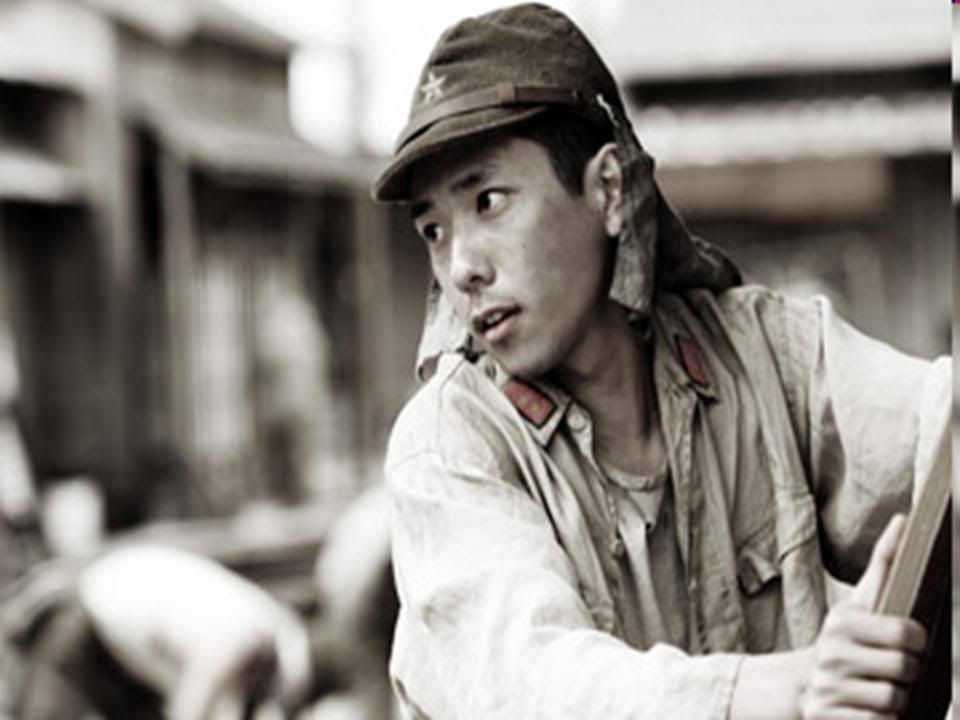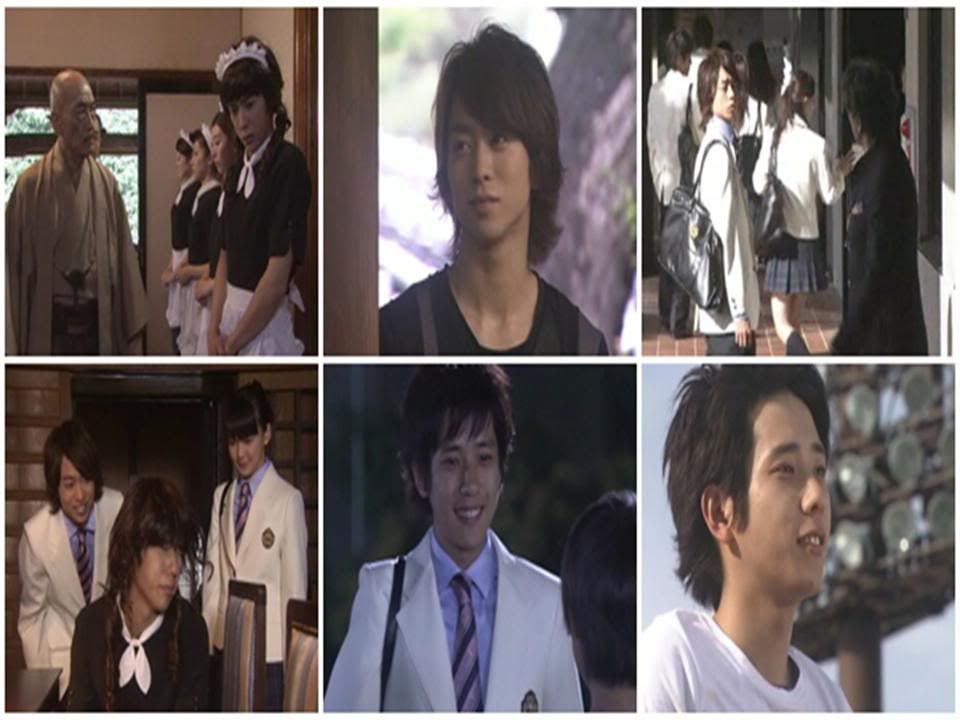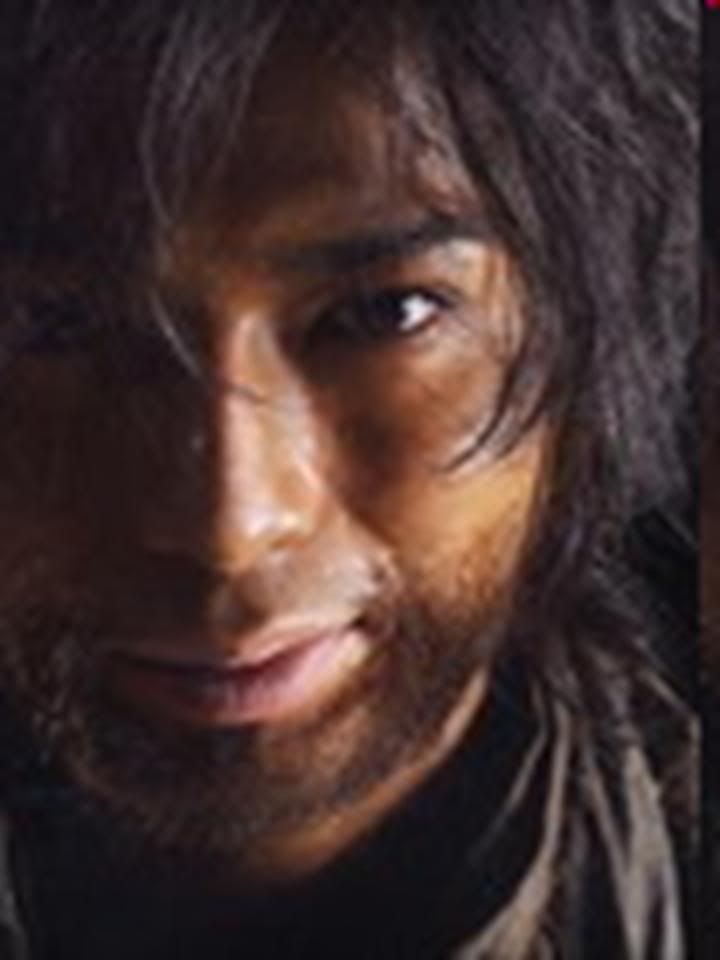
One of Johnny's Jimusho's top pop idols, Jun Matsumoto talks to Asia Pacific Arts in a rare English-language interview.Of all of talent agency Johnny's Jimusho's everlasting army of boy bands, Arashi has the guys who seem set on doing the dirty work. Kazunari Ninomiya appeared in Clint Eastwood's Letters from Iwo Jima as a convincing army grunt, was the voice of the packrat-like Kuro in 2006's Tekkon Kinkreet, and last year played the piss-poor Taro in the TV drama series Yamada Taro Monogatari. Masaki Aiba doesn't appear in nearly as much, but he handles wild animals and their precious bodily fluids every week on Shimura Doubutsuen (Shimura's Zoo).And now Jun Matsumoto -- aka Matsujun -- is joining the fracas, having been just cast as one of two filthy peasants in Shinji Higuchi's remake of the Akira Kurosawa classic, Hidden Fortress: The Last Princess. Is Arashi signaling the end of the squeaky-clean romantic roles Johnny's boys normally traffic in?

( Nino in Letter to Iwo Jima)

( Nino and Sho in Yamada Taro Monogatari )
Matsumoto has had an extensive career in Johnny's, joining in 1996 without having to audition and debuting just three years later with the now hugely popular pop group Arashi. While the group began its climb as the fore front of a new Johnny's generation of pop idols, Matsumoto himself began honing his career as an actor, starring in the TV drama Kindaichi Shonen no Jikenbo as boy detective Hajime Kindaichi, which would lead to his award-winning co-starring roles in the hit TV series' Gokusen and Hana Yori Dango.His most recent television triumph was winning the award for Best Actor at the 53rd Japanese Television Drama Academy Awards for last year's cooking drama Bambino!, where Matsumoto played a confident young cook from Kyushu who learns the hard knocks of the professionalculinary world after working as a training chef in Roppongi.
This is a full plate for any young actor, but just remember that in the Japanese entertainment industry, you sleep two hours a day, at most,and it's usually in a chair. In addition to his film and TV acting duties, Matsumoto handles weekly commercial and music video shoots,modeling gigs, daily variety show appearances, preparations for concerts, and the occasional theatrical stage role such as 2006's Yukio Ninagawa's adaptation of Byakuya no Valkyrie. Such is the ceaseless life of a top Johnny's talent.
When he's not doing one of these things, he's flying out to Los Angeles to promote films like the remake of Hidden Fortress. APA caught up with Matsujun for his first ever interview for an English-language publication to ask him about his role in the film,what powers him on as an entertainer, and what his fans and the entertainment world at large can expect from him in the future as both an actor and as a member of Arashi.
--Bryan Hartzheim
Interview with Jun Matsumoto
Interviewed by Bryan Hartzheim and Kanara Ty
April 27, 2008
Beverly Hills, CA
Transcription and Japanese translation by Bryan Hartzheim

APA: Are you nervous about the reception of this film? Since it is a remake of an Akira Kurosawa film, there will be probably high expectations.
JM:I'm not nervous about it at all now. Before the shoot, I was actually very nervous because we were remaking a Kurosawa movie, and I felt alot of pressure to live up to expectations. But when shooting started,I also realized that Kurosawa himself wasn't going to be directing this movie, and we were borrowing his movie to make a new piece of entertainment using better film making techniques that weren't available in Japan 50 years ago. I thought we would make something that wouldshow case Japan's evolved film making style that is reflected with the influx of Hollywood material, our traditional style of film making, and many other different kinds of movies. I hoped we could draw upon this mix of movie making styles and make something that Kurosawa couldn't make 50 years ago, rather than try to recreate what Kurosawa did 50 years ago.
APA: How much did you look at Star Wars for this film?
JM: I didn't watch much of Star Wars again for the creation of Takezo, but, and I was told this by the director too, Takezo has a little bit of Luke Skywalker in him, and a little bit of Spiderman, and a little bit of Jack Sparrow. I tried to draw the essence from all of these Hollywood entertainment heroes to create anew hero in Takezo.
APA: Which scenes in the film would you like the audience to pay special attention to?
JM: There's a scene in the film with a himatsuri (?fire festival?) which I think conveys very well the nature of a Japanese festival, and what the spirit of a jidaigeki is. It's also gorgeous to look at.

APA: Were there any scenes in the film that you had particular trouble with?
JM: That himatsuri scene and the scenes of the latter half of the movie with the studio-set fortress were also the most difficult. I've never seen orbeen on as large or beautiful a set like that before, but those scenes were especially difficult to do.
APA: You had to master horsemanship and sword fighting for the role. How hard was it to learn both of these skills?
JM: It was my first time on a horse, so I started doing it for about three months before the shoot, but even if I say three months, it was really only about thirty 90-minute sessions, so I don't think it really involved lot of training.

APA: Often,actors find it difficult to separate their acting roles from real life,and in the Japanese entertainment industry this must be especially problematic considering many performers must juggle so many roles simultaneously. Since you're involved in so many other projects, was ita problem either getting fully into the Takezo role, or was it aproblem switching out of it for a variety show? Can you elaborate on your own approach to acting, especially with ?HF??
JM: I really thought for this role, as a jidaigeki piece, it was much more different than any previous dramatic roles I've done in the past. I'donly done contemporary dramas and films at this point in my career, and so when I looked around on the set I saw nothing really different frommy real life, but for a jidaigeki film, you have to go back intime to the period itself. There are no lights or chairs or anything modernized, and this setting helped pull me into the role, just as the wig, makeup, and total costume does as well. Normally, for other media appearances as Jun Matsumoto I only have to get prepped with a third of the time it takes for make up or what ever. But when I'm being transformed into the Takezo character and getting gradually dirtier and less of who I normally look like, it's much easier to gradually fall into that role as well.
I have a question: do people in Hollywood only do variety shows and not appear in other roles?
APA: We don't really have variety shows. But TV actors will occasionally go on to film roles.
JM: And does the opposite happen as well?
APA: Sometimes, but it's not usually considered a good thing.
JM:I wonder if that's because the culture of film here in America has greater value than it does in Japan. I feel it's considered more a separate and higher form of entertainment here.
APA: Speaking of various entertainments, who were your influences growing up?
JM:First of all would be the founder of Johnny's Jimusho, Johnny Kitagawa.For me, he's a genius. I've never met anyone who I thought was such an incredible person as him. I don't know how I'll change in the future,but he's influenced me the most in my life so far.
APA: And as an actor now?
JM: As an actor, I really like Johnny Depp. He's so popular now, but before that, I really liked his work in movies like Edward Scissor hands and Dead Man. Kevin Spacey is also good. I also liked the young Dicaprio and Brad Pitt when he was doing movies like Snatch. Japanese actors, I like kabuki, and much of my inspiration comes from watching kabuki actors.
APA: Your Arashi colleague Kazunari Ninomiya has worked with Clint Eastwood on Letters from Iwo Jima. Are you interested in working in Hollywood as well?
JM:If I can. [laughter] I'm really honored to be here today and have the opportunity to see how people react to the film. There's nothing decided right now, but it'd be great to have more chances like today where the film can be screened for new audiences like here in America.

APA: What other sorts of roles are you interested in?
JM:I don't have a role that I'm particularly targeting. The most important thing for me is not the role itself but the script and the people around it. Even if there was a role I thought would be interesting, if there isn't an interesting script around it, there would be no point.
APA: You're one of the "elites" in Johnny's and Associates ? skipping an auditionand you immediately joined the company. Apparently, Johnny did see a lot of star quality in you - and that's shown through your success with Arashi, television and film roles. Did you anticipate this at a young age?
JM:Wow, I'm thought of as an "elite?" [laughter] I didn't know we could be classified as such. To tell you the truth, I had no reason to believet his, but I had a strong intuition that I'd be part of and debut as agroup like Arashi. I don't know why I believed this, but it luckily come true.
APA: Arashi is approaching their 10th Anniversary as a group - do you guys have big plans? Will Arashi be doing any international concerts anytime soon --like say, America?
JM:Well, I haven't had much time to think about a 10th anniversary as 10 years have passed really quickly for us, but I know that's because of the fans and staff around us who've supported us. I don't know how we five will celebrate the occasion, but I want to express our gratitude to as many people as possible. Regarding acting, like I said before,I'd like to continue to do movies that interest me and talk to more interesting people above all else. For that, I know I'll have to try to improve my abilities ? whether that be singing, dancing, acting,speaking ? I know I have to continuously try to improve myself. I'm doing so many things right now I tell you, I don't have much time.
APA: You've recently shot two movies back to back, and have been busy with new television shows, including the continuing Arashi no Shukudai-kun, andan upcoming dome concert with your other members of Arashi. When do you find time to rest?
JM: I was talking to some people from a Japanese TV station here inHollywood, and I was really surprised. In Hollywood, you make movies that you assume will be shown around the world. I don't have much experience with that feeling. I had assumed I was making Japanese entertainment in Japan for Japanese people, but with the Internet, it'snow being seen everywhere, much like movies. The fact that we can see Japanese variety shows here in the U.S. made me realize just how large the world had become. When I receive email or letters from people here in America, like this last time when I was in Las Vegas and got aletter saying, "When are you guys gonna have an American concert?," it made me realize that there is an audience for us here too, and makes me hope that one day we can hold a concert here in America or appear in international films. If Hidden Fortress can screen here in the future, I hope many people can see it.
APA: Is there anything you'd like to say to your fans in America?
JM: Thank you for supporting us despite our being on a tiny island country across the ocean. It truly makes me feel happy.

No comments:
Post a Comment